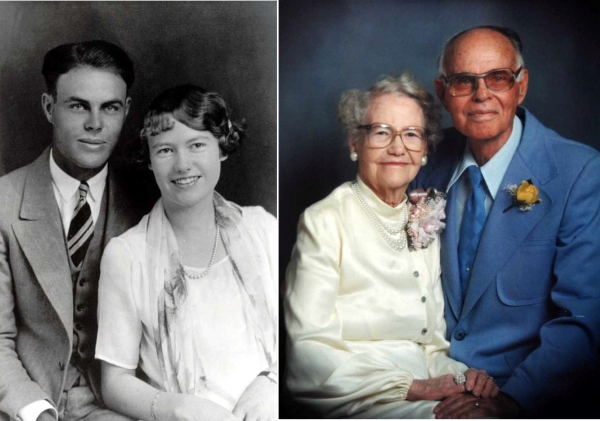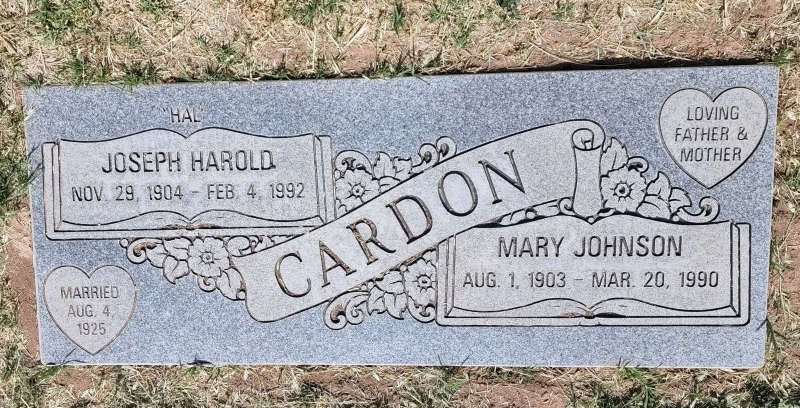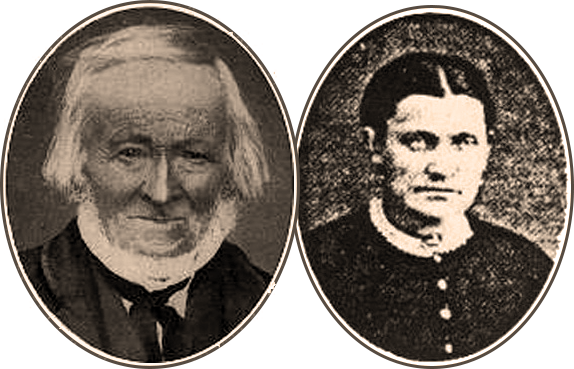29 Nov 1904 – 4 Feb 1992
Great-Grandson of Philip Cardon and Martha Marie Tourn
Grandson of Louis Philip Cardon and Susette Stalé
Son of Joseph Samuel Cardon and Rhoda Ann McClellan

Biography of Joseph Harold Cardon
Contributed by Linnea Cardon
I was born November 29, 1904, in Colonia Dublan, Chihuahua, Mexico. My mother told me that I arrived about one half hour too late for the family’s Thanksgiving dinner. I was born at home as there were no hospitals in Colonia Dublan.
My father was Joseph Samuel Cardon. My mother, Rhoda Ann McClellan, was his third wife in a polygamous marriage. My father’s first son had been named Joseph Elmer, and it was by mother’s request that I was named Joseph Harold.
Growing up I had plenty to eat from gardens and animals grown by my parents. As for clothing, I never was cold, after all one needs so few clothes.
Work History of Joseph Harold Cardon
Here is a history of some of the kinds of work I have done in my life.
After having left our home in Colonia Dublan, Chihuahua, Mexico, we missed our home, a barn full of feed for animals and chickens also a fine garden and a pantry full of canned foods.
This happened in the late part of July 1912. Here we were in El Paso, I was seven with three sisters, three brothers and a widow mother. We had a few clothes and two rolls of bedding and a little money in a new land, with all our family and friends in the same situation.
The two older girls Eva and Ethel were married. Lester was eighteen but had health problems. Bill was sixteen and Earl Leon fourteen. It fell to these two to support a family of eight. We decided to go to Tucson, Arizona. Here our home location had to be in the area where the boys could find work. It was a beginner [home], but it was a tent sitting on the ground; there was a clear stream of water near by and three stones sitting on the ground – made a stone to cook beans and a few other foods. Tucson is a place that is hotter and colder than El Paso so you can imagine our life.
We boys would do anything to make some money, we learned the hard way that every family needs a father. The following are a list of work jobs I had. First I must mention selling newspapers. All boys know how to do that. One evening Earl was doing it, but instead of selling his papers in the park, he folded them, then just sat on them. after all the other boys had finished and gone home Earl started his sales. An elderly man who had been watching him ask why he did this. Earl answered, “Well, I’ve heard people like the latest news, so I’ve waited so I could give them the latest news!” The man thought it was such a special reason that he bought all Earl’s papers so he could go home.
In Tucson I worked with two brothers-in-law in dairy jobs. We washed the empty milk bottles and cans, helped deliver milk. Later I drove two horses hitched to a hayrack wagon, hauling loads of alfalfa hay, grown some five miles away.
Back in El Paso at age eleven I was a delivery boy for drug stores, grocery and meat markets and a general Delivery Service, all had to do with merchandise. I rode on a bicycle.
I also walked up and down the rows of tents of General John J. Pershing’s troops stationed near Fort Bliss, selling peanuts, chewing gum and homemade candy to his men.
I worked in a Skating Rink, putting on and taking off skates. I was a hat check boy in the new Paso Del Norte Hotel.
In my mid-thirteenth year, we moved from El Paso to live in Duncan, Arizona where we three boys and my brother-in-law Frank Farnsworth tried to buy a beautiful farm and home. The property was well laid out, with ditches for irrigation and one of my main jobs was irrigating the farm all night. This happened very often and I didn’t enjoy going to school next day. Here I missed time in school sometimes as much as two or three months during harvest season then again the same thing happened for Spring planting.
While here in Duncan I worked on the road leading up to Clifton. My work was driving a double team Fresno, moving dirt to low places.
Back in El Paso we came again in the Spring of 1922. I found work selling ice. When the weather turned cold I found work in a service station, later I worked in the warehouse of a paint and glass company.
I also delivered coal with a team and wagon, then was given a Ford pickup. I think my next job was with a window and door manufacturer. I also worked in a lumber yard.
I was about eighteen when I went to Colonia Juarez with my mother and sister Fern to graduate from High school. Here was where I met Mary.
I returned to El Paso in the Spring and found work in a Ford auto agency, there was a gas service station also a repair shop of an Auto Sales agency in Cuidad Juarez. I went to School of Mines one year.
I was married when I was twenty. We moved to San Antonio later re-named Cuauhtémoc, Chihuahua. There I built a lumber yard and lived in a house within the lot. We were happy, but that didn’t last. After three and a half years, revolution problems broke all the banks so it was back to El Paso. We arrived on the sixteenth of March 1929. We still had a few clothes and a roll of bedding.
I was lucky to find work with building contractors and enjoyed that experience. With the depression these men had to close their work and go out of business. I continued building with my uncle Ed McClellan, who at that time was in charge of the erection of our Douglas Street Chapel. After fifty one years it is still in service, a beautiful building. It was the first chapel built in Texas, also a little later became the First Stake House.
When it was finished I went to work for Armour Meat Packing Co. It was steady employment for the next eleven years. Then I was offered a Civil Service job to help in the construction of a Federal detention unit named La Tuna in Texas, near El Paso. This job was remodeling and building both homes for the employees and a large portion of La Tuna building and work shops. I operated a Carpenter shop, all accomplished with inmate labor. I retired in 1969 after about twenty-six years of service. I was sixty-four at this time and with a civil service pension, social security and property acquired with help of a much appreciated family both children and wife. I needed to retire. I could not keep up the pace of working a job, helping at the motel and doing my clerk work. I had put in near twenty-five years of book keeping for my ward and the motel.
I would like to add a bit more about my many partnerships – I think most are hard to do but mine were all with very good men and I respect them all. My first partnership was with my brothers, Lester Leon, William Afton, Earl Leon all Cardons and myself. Ours was the Automobile work Service Station, also the lumber yard. After leaving Mexico my next partner was my brother-in-law Frank Farnsworth. We became involved in building motel rooms, five all together. Then the next was Leland Jackson, he had a dairy and needed a man with boys to help him. This job lasted only three months. When I was offered my job back at La Tuna on a permanent basis, I was glad to go back. Last but not least was a partnership with my wife’s brother. We, with the help of my boys, built the All State Motel on Montana Street. It still stands but has been sold.
I seems to me I have been a very busy man, but I’ve also enjoyed serving in my church. I am the only child of my fathers “21″ children now alive.
-Published on familysearch.org, ID #KWZ7-27H
My Father, Joseph Harold Cardon
a tribute from C. H. “Dick” Cardon
August 27, 2002
My father, Joseph Harold Cardon was born in Colonia Dublan, Chihuahua, Mexico, to Joseph Samuel and Rhoda Ann McClellan Cardon. He was the eighth of nine children. Life was normal for him in the early years of his life but changed with the unexpected death of his father when he was about four years of age. Within a few years of the passing of his father, there was a revolution in Mexico and all of the Mormon colonists had to flee Mexico, only taking with them what they could carry in suitcases. His widowed mother had nine children to care for and the economic situation was desperate for them. They arrived in El Paso, Texas with no money and nowhere to go. The U.S. Government gave them two tents and passage to Tucson, Arizona by train. They lived with other expatriated colonists for about two years in Binghamton, a small town just north of Tucson. All of the children helped to keep the family alive with odd jobs. When the children were a little older, they were able to buy a farm in Duncan, Arizona. Dad said that it was a very nice farm, and the family began to prosper. In the depression of 1919, there was no market for the farm products, and they lost the farm to the bank. Dad said that the lesson of losing the farm was an experience that he was never to forget.
Dad’s family was a faithful family to the Lord. Through all of these difficult circumstances they were always faithful and attended Church regularly. The hard times brought the family together in a way that lasted throughout all of their lives. Eventually, many of them moved back to El Paso, Texas, where the family prospered. While I was growing up in El Paso, I remember that my dad’s brothers and sisters all lived close together, within a few blocks of each other. They always provided a small home for their mother and in some cases they were in partnerships in their businesses. I did not think this was unusual at the time, but find later in life, that such an extremely cohesive family is rare. When we went to church on Sunday, there were all of our family: uncles, aunts, cousins, and of course, grandmother. When I went on my mission, all of my family gave me monetary assistance. It was a blessing of our family unity. Dad was the ward clerk for about 25 years. This is a difficult job in the Church but he was ever faithful in his calling. His greatest desire in life was to see all of his children with a college degree. He gave them that which he was not able to receive in his youth.
Dad was ever kind and gentle with his family. I don’t recall him ever angry with any of us. He was concerned at times with our actions but there was always peace and happiness in our home. I never heard an argument between Mom and Dad. I think that is a remarkable achievement in their wisdom and self-control. We loved him and trusted in him. He was like an anchor in our lives.
-Published on familysearch.org, ID #KWZ7-27H
Restlawn Memorial Park, El Paso, El Paso County, Texas

